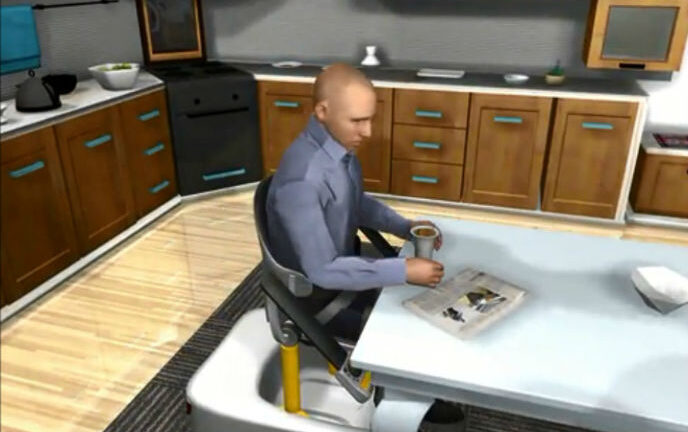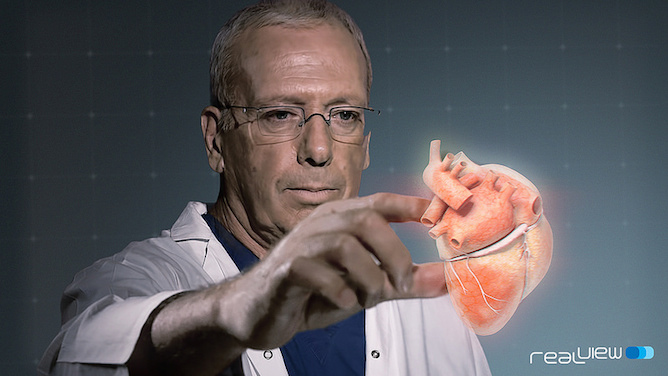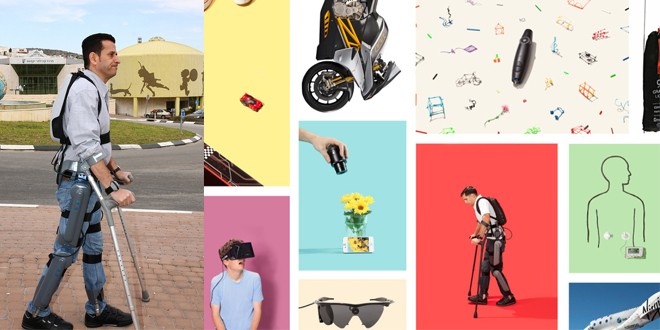After an accident left Israeli entrepreneur Amit Goffer as a quadriplegic, he decided to develop a system that allows wheelchair users to walk, climb stairs and meet the world eye-to-eye.
Say the word “exoskeleton” and most people think of actress Sigourney Weaver in the movie Alien. As Ellen Ripley, she brandishes cargo-loading pistons for arms and legs to duke it out with the mother alien. After that, just walking may seem a mundane use for exoskeletons, but the action is more powerful than any science fiction story when paraplegics can use these motorized armatures to conduct daily life as their mobile counterparts do.
ReWalk is an Israeli-developed quasi-robotic ambulation system developed by ARGO Medical Technologies that provides a viable, upright day-to-day alternative to wheelchair users. The wearable upright mobility system was specially designed for individuals with lower-limb disabilities. By restoring upright mobility, the developers say, ReWalk delivers benefits on the health, economic, and societal levels.
“What we want to do is have the person wake up in the morning, put on clothes, put on the ReWalk, go to work and go throughout the day, wearing it,” Dr. Amit Goffer PhD, founder and director of Argo, and ReWalk’s developer, tells ISRAEL21c.
Regaining dignity
Uri Attir, CEO of Argo, adds that users “regain their dignity” by being able to stand eye-to-eye with colleagues. “It may seem trivial, but it’s not,” says Goffer emphatically.
Goffer should know. Formerly an electrical engineer at RAFAEL and Elscint, he left in 1994 to found Odin Medical Technologies, the developer of a revolutionary inter-operative, real-time MRI.
Odin was acquired by Medtronic for $30 million in 2006 but by then, Goffer was out of the picture, the victim of an accident that left him a quadriplegic. Following intense rehabilitation, Goffer got to work, developing the ReWalk prototype in his home, funding it both privately and with a Tnufa – Startup Promotion Program grant.
The prototype was past the proof-of-concept stage when Goffer entered the Technion Incubator, TechnionSeed.
ReWalk comprises a light wearable brace support suit which integrates DC motors at the joint, rechargeable batteries, an array of sensors and a computer-based control system. It fits the body snugly to detect upper body movements, which are used to initiate and maintain the walking process. Wearers also use crutches for stability and safety. “The main issue was triggering and marinating gait. We tried it on three paraplegics the first time and the results gave me the confidence that it worked,” recalls Goffer.
Argo spent two years under the auspices of TechnionSeed, and currently operates out of Haifa’s MATAM high-tech industrial park. The original investors include two out of the three incubator owners, venture capital funds Vitalife and ProSeed, along with the Technion Research & Development Foundation (TRDF), TechnionSeed and the Office of the Chief Scientist of the Ministry of Industry, Trade and Labor.
The company’s current round of funding started in January 2008. So far, $1 million has been raised out of a targeted $5 million, an investment from the Marc Rich Foundation. “That money will cover our operating needs for the next one and a half years,” says Attir. “By that time, [late 2009 or early 2010] we intend to be selling commercially”.
The target market, according to Goffer and Attir, will be the Western world wheelchair-user community, of which 300,000 are spinal cord injury sufferers (125,000 in the US and 175,000 in ROW) who are physically able to use crutches as a stabilizing tool.
Attir estimates the initial market at $6 billion per year, worldwide. “That’s a very conservative estimate, because it doesn’t take into account other forms of wheelchair bound persons such as victims of stroke, multiple sclerosis, and certain forms of cerebral palsy [estimated at 2.8 million in the US],” he says. “I can’t name an exact price but I can say that a very good motorized wheelchair costs between $15-25,000 and an iBot [a sophisticated wheelchair designed by Dean “Segway” Kamen] costs $35,000 and we’ll be well below that.”
Reducing expenses
ReWalk also reduces expenses for taxpayers, the company says. On average, a paraplegic costs HMOs in the US over $270,000 during the first year of hospitalization and almost $28,000 in each subsequent year, including re-hospitalization and treatment for conditions such as pressure sores, recurrent urinary tract and other urological infections, and others.
The standing position afforded by the ReWalk, says Attir, significantly reduces many of these and also serves as physiotherapy. “It would also render obsolete the need to periodically go to a rehab center and use the automated treadmills, which cost 300,000EUR each. It will replace the need to install stair climbers in the home as well,” he says.
ReWalk is undergoing clinical trials in Israel at the Rehabilitation Hospital at Chaim Sheba Medical Center – Tel Hashomer, with pilots planned for rehab centers in Holland and Italy. A US trial is scheduled to begin in November at the Moss Rehabilitation Center in Philadelphia, after which Argo will apply for FDA regulatory approval.
Argo’s demo video features team member Radi Kioff, a 40-year-old Druze Israeli citizen who was shot in the back while serving in the Israel Defense Forces during the first Lebanon War. Ironically, the man who devised the system that allows Kioff to walk cannot benefit from his own invention. A quadriplegic, Amit Goffer has only partial use of his hands, but not enough to operate the ReWalk.
“This isn’t the first company I’ve founded,” says Goffer with equanimity. “My incentive to develop it was a business opportunity. When I was injured the first thing I was offered was the only thing: a wheelchair. I do believe that in the future, in many cases, the ReWalk – or its competition – might be offered. I don’t see any reason for the wheelchair to be the sole solution. There hasn’t been a real change [in the technology] for centuries. So, we’re taking a safe business approach, starting with paraplegics, and the time for a quadriplegic like me will come.”
CEO Uri Attir himself has a hook prosthesis as the result of a war injury that took his hand when he was serving in the Israel Defense Forces. “Amit and I come into meetings with prosthetics manufacturers who are strategic partners, and people ask ‘Are you buyers or sellers?'”, he smiles. “And we answer: ‘Although we seem like customers, we’re here to sell you products’.”















